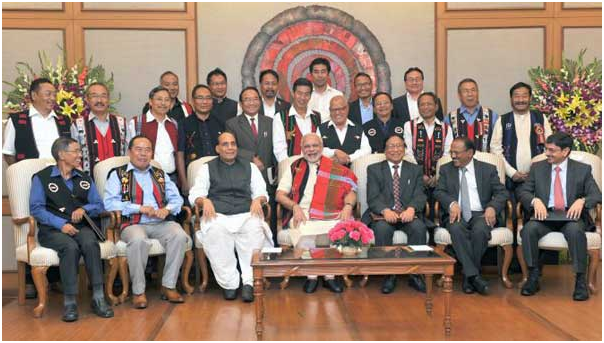NAGA Accord: The Mouse That Roared?
Naga Accord, or Agreement?

NEW DELHI: The “historic” New Delhi-Naga accord signed by the government with the National Socialist Council of Nagaland (Isak-Muivah) in the presence of Prime Minister Narendra Modi and NSCN chief Thuingaleng Muivah has run into trouble even before the details have been disclosed. And government interlocutors, faced with a building backlash from the north-east, have been virtually forced to move back a couple of steps in admitting that the ‘accord’ was not a final document but just a draft agreement at best.
Witness the movement. The week opened with the disruption of Parliament, a belligerent Congress party after the suspension of its MPs in the Lok Sabha, followed by the sudden announcement that the government had reached an accord with the Nagas, thereby ending the vexed dispute that has been hanging fire since independence. PM Modi spoke amidst smiles, congratulatory handshakes, of the “historic peace accord” adding, “"the Nagaland political issue had lingered for six decades, taking a huge toll on generations of our people." The impression given to the media in attendance was that the accord being discussed for years now with the NSCN (IM) had finally been agreed upon, and as PM Modi tweeted “today, we mark not merely the end of a problem but the beginning of a new future. #Nagaland http://nm4.in/1g0sUvP
The news alerted all states in the North East, as a ‘solution’ as per the NSCN(IM) position lay in sovereignty and the creation of a Greater Nagaland, carved out of the other states with a substantial Naga population. Has the NSCN(IM) given up its position? was the question being asked by the Nagas with the corollary, “If yes, how will they justify the struggle of the past decades? There was no answer, as there were no details being given out of the ‘accord’ finalised in Delhi.
Has the government agreed to the demand for Greater Nagaland, was the other question creating major concern amongst the states of Assam, Manipur and Arunachal Pradesh. The reaction built up on speculation, to the point where the Chief Ministers of these states felt compelled to rush to Delhi for clarifications. They met PM Modi, Home Minister Rajnath Singh and were now told that no this was not a final accord, it was just an agreement, and that before anything is finalised they would all be consulted. They have returned to their states with the assurance from the top echelons of the government that they will be part of the final decision.
This takes the issue back to Nagaland where the reaction to this news has been extremely adverse. They have taken us for a ride, is the response of the people according to well informed journalists.
It has been clear from the response that the sticking points, if indeed ‘resolved’ will create a huge political backlash for one of the other signatories to the accord. If the government has conceded on the NSCN-IM’s demand for a Greater Nagaland, the north-eastern states will react strongly, perhaps violently. This has been the issue all along, and according to sources, there is no indication that a via media has been found. The present interlocutors said that the NSCN-IM has agreed to work with the Indian Constitution, but this then raises question marks over the compromise on sovereignty and what actually has the Naga group achieved. Besides from the New Delhi perspective, if the government has conceded major ground on the issue of sovereignty even if through a compromise of sorts, this will impact on all future peace talks with armed insurgents who still operate in the states of the North East.
From all the confusion emerging because of the inexplicable decision to announce an ‘accord’ and then keep it secret is the one question that those associated with the peace process in the North East and in New Delhi are asking: what was the need for this sudden announcement if nothing really is finalised? Conversely, the question is being reframed to ask: what has been agreed to that they do not want the rest of the country to know?”
The one answer that many officials conversant with and part of the peace process in some capacity or the other agreed to was that there was some level of desperation from the NSCN-IM. Muivah is aware of the fact that he is not a Naga, and is regarded with some suspicion by many there. The Naga credibility for the organisation comes from Isak Chishi Swi who is in the intensive care unit of a hospital in Delhi. It was thus necessary for the two leaders to get a pact together during his life, so that it was not rejected altogether by the Nagas as a Muivah initiative or as a source said, “sell out” even.
PM Modi is thus credited with going ahead on this as he needed diversionary tactics, being under tremendous pressure in Parliament from the Opposition. He had clearly hoped that the accord would then come as a positive in a pond of negatives, and break the cycle of critical headlines in the media. Interestingly Congress president Sonia Gandhi questioned the government’s failure to consult the chief ministers subsequently, saying, "from this I take that this government is arrogant... their arrogance is even more clear than it was before, it's an insult to the chief minister, not only to them, but also to the people of those states and federal structure of our country."
All in all, the story has changed sharply from ‘what is there in the accord’ to a ‘is there a Naga accord at all?”



